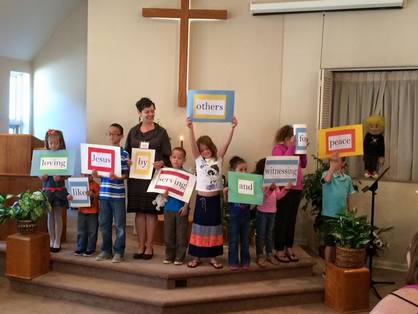 Mark 12:13-17 Jesus has some radical and rebellious ideas about money. He rambunctiously overturns the money-lenders’ tables at the Temple to condemn their exploitation of the poor in the name of religion. He leaves a rich man quaking in his boots by proclaiming that a camel could sooner pass through the eye of a needle than a rich person enter the Kindom of Heaven. So the Pharisees figure they can catch Jesus in a tricky trap when they ask about paying taxes to the Empire. Say no, and Jesus admits to treason in public. Say yes, and the growing Jewish movement in opposition to Rome might attack him as a traitor. The Pharisees must like their odds, but Jesus is even trickier. When Jesus answers questions with riddles and parables, Jesus plays the fool, in the best sense of the fool. What does it mean to play the fool? We know the bumbling fool – the three stooges, for example, but the fool archetype is nuanced and provocative, just like Jesus. The jester in ancient Egyptian courts, Aztec courts, and European courts throughout the last thousand years is often a wise fool.Like the joker in a deck of playing cards, the jester or joker or fool is unpredictable. Entertaining the royal family is the jester’s main function, but the jester is often a key advisor, the messenger of bad news, the political commentator who can get away with criticizing the establishment through humor and trickiness. By doing what is unexpected, with jokes and clever insight, the jester entertains and offers political strategy at the same time. Check out this modern jester: (look on youtube: giving to people who give) Give to Caesar what is Caesar’s; give to God what is God’s. Many people would call this generosity foolish, but it wakes us up to another way of being. Just like the joker in any standard deck of playing cards, the Fool is an expression of play, spontaneity and creativity. The Fool is said to live in the moment, in harmony with nature. The Fool plays like Jesus, with riddles and parables. And Jesus is the primary Holy Fool, turning all this spontaneity, creativity and playfulness toward reconciling people with themselves, each other, and God. The Holy Fool is wise as serpents, but innocent as doves. Just like the guy giving away $20 bills in the video, the Fool is guided by innocence, not cynicism. Sometimes we think of fools as crazy, but Holy Foolishness is the best kind of crazy. As Martin Luther King said, “Modern psychology has a word: maladjusted. In order to have real adjustment within our personalities, we all want the well‐adjusted life in order to avoid neurosis, schizophrenic personalities. But I say there are certain things in our nation and in the world to which I am proud to be maladjusted. I say very honestly that I never intend to become adjusted to segregation and discrimination. I never intend to become adjusted to religious bigotry. I never intend to adjust myself to economic conditions that will take necessities from the many to give luxuries to the few.” Our world is unstable - climate change, violence, economic collapse, families and communities disintegrating... The world needs us to foolishly, innocently, naively, maladapt - not adapt- to all this dis-ease. The world needs our hearty, holy foolish instability – not climate change, water shortages, biological and environmental disasters – but the instability of turning over tables of exploitation. The world needs our insanity – not the insanity of fear-mongering, police brutality and stockpiling weapons, but the insanity of turning the other cheek, and of giving our shirts as well. Paul writes to the Corinthians, “The wisdom of this world is foolishness in God’s sight. We are fools for Christ’s sake.” Our govenor Mike Pence decided that Syrian families, refugees, on their way to Indianapolis would be turned away, because the recent violence in Paris may have involved summertime pushing as a Syrian refugee. He said "Indiana has a long tradition of opening of arms and homes to refugees from around the world but, as governor, my first responsibility is to ensure the safety and security of all Hoosiers." Who is a Hoosier? Who is our neighbor? How would Jesus play the Holy Fool in this moment, as fear and revenge and suspicion rise naturally in our hearts and communities? Remember Paul's words to the Corinthians, “The wisdom of this world is foolishness in God’s sight. We are fools for Christ’s sake.” ....
0 Comments
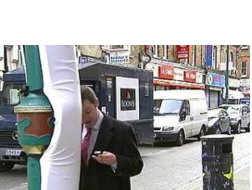 Mark 10:46-52 "You know we have ten times as many medical information codes than we did in September? The brand-new ICD 10 – International Classification of Diseases – increased the ICD-9’s ~15,000 codes to ~150,000 codes for medical billing and other record-keeping. Now doctors can specify that an injury happened in a prison swimming pool: Y92.146, or that someone was crushed by a human stampede while resting or sleeping: W52.04. Or that someone was burned when their water skis caught fire! W220.2 is for walking into a lamp post, and W220.2XD is for walking into lamppost, subsequent encounter. Now I don’t want to poke too much fun at these codes; they probably each exist because the events have happened at least once. And there’s nothing funny about being injured in a prison swimming pool. But I do chuckle at people glued to their cell phones walking into lamp posts, which has become such a common occurrence that London actually padded its lamp posts a couple years ago! I hope this hasn’t happened to any of you! Even if you haven’t walked into lampposts or fountains with your eyes on your phone, what keeps you from looking up and seeing the people around you? ... How are you blind to the life and need and pain and humanity that is all around you? Jesus can heal you from this blindness just as he healed Bartimaeus. Because Jesus teaches us how to see each other, and when we look up and see each other, we’ve taken the first step to loving like Jesus. Frederick Buechner writes, “When Jesus says the greatest commandment is to love God and neighbor, Jesus asks us to pay attention. If we are to love God, we must first stop, look, and listen for God in what is happening around us and inside us. If we are to love our neighbors, before doing anything else we must see our neighbors.” Where do you see God happening inside and around you? God may be easy to see in the big stuff, like the outpouring of love and financial support the US Church of the Brethren has shared with the church in Nigeria. God may be easy to see in the heroic, like people who risk their bodies and lives to work with Christian Peacemaker Teams around the world. God may be easy to see in the stark, like soup kitchens and foot clinics for the homeless. I think God is hardest to see in our own neighbors, in one another, in ourselves. God seems most elusive closest to home, in the day-to-day.... Who goes to the Grand Canyon and fails to see with artist eyes? Who hears the Halleluiah chorus and fails to hear with artist ears? But in the mundane of everyday, our inner artists might fall asleep.... In the midst of this season of change, we can put on blinders like a workhorse, hunker down, try to ignore the traffic sounds around us, and hope we get to familiar ground soon. We can see with lazy vision the worst in each other, and the worst in ourselves. We can look up! And pay attention! And see one another with love-colored glasses...."  "What do you do with the parts of yourself you don’t like? The angry parts that worry you, the hurt parts that embarrass you, the ailing parts that scare you? Do you pull up a chair and allow these unwanted feelings and parts and memories to settle in with you? Do you get to know these elements of yourself, seeking to understand yourself more fully? Or do you deny them, reject them, hide them, or even pluck them out like a distracting eye, or cut them off like a sinning hand? Of course, we all do all of these things, we spin from one strategy to the other, depending on how worn out we are or how strong our support system is. We can offer welcome – whether it’s patiently nursing a cold or thoughtfully working through old trauma – when we’re feeling secure, when we’re not worried about running out of sick days while nursing that cold, or in a toxic relationship while trying to work through that old trauma.... We get mixed messages from scripture about what to do with the parts in our bodies and selves that we don’t like, that have been a source of suffering. In Matthew, Jesus says to pluck out our offensive eye or cut off our loathsome hand. But we also read so many healing stories in which Jesus brought new function to parts of people’s bodies that they had bemoaned and condemned. Jesus says to forgive countless times; why not forgive our offensive eye or loathsome hand? We tend to follow the advice given in Matthew when it comes to disease. We use surgery, antibiotics, radiation and other medical means to pluck out or cut off the parts of our bodies that we don’t like, the parts that are damaging us. What we do with cancer is the epitome of this – while we “manage” and “treat” heart disease, we “fight” and “battle” cancer. Cancer is absolutely one of the scariest and most fatal diseases we face, and our metaphors reflect the intensity of our fear and resentment. In 2009 President Obama wrote, “Now is the time to commit ourselves to waging a war against cancer as aggressive as the war cancer wages against us” as he increased funding for cancer research. I can’t agree with Obama that cancer is waging a war against us. First, because cancer is something that our own bodies create as our cells reproduce and mutate. It’s mind-boggling, actually. Our cells naturally reproduce as we grow and heal and age. Some of these cells mutate, or don’t reproduce identical offspring. And these mutations can lead to cherished new developments – like our history-changing opposable thumbs. And these mutations can lead to both benign and cancerous tumors.... We don’t feel invaded by heart disease the way we feel invaded by cancer. Isn’t that fascinating? Heart disease is the leading cause of death in this world and it’s caused by the same sorts of things that cause cancer (heredity, lifestyle, pollution). But we don’t say heart disease is waging war on us. Cancer feels predatory in a way many illnesses don’t, as cancer cells rampantly divide, sucking up nutrients and blocking blood flow. They act like a parasite within us, yet parasites are a different species than their host, and cancer cells are the mutated offspring of our own healthy cells. Waging war on cancer means waging war on our own bodies – and it sure feels like it for many people gutted by chemo and burned by radiation. Military metaphors haven’t helped us combat terrorism or obliterate drugs or destroy poverty. When it comes to the physical, mental and chemical illness within our own bodies, I don’t think these metaphors are going to save us any better than wars on terrorism, drugs or poverty do. The danger of a war on cancer is that we might lose – then we’re not only dying, but we’ve failed, too. Humans used to believe that illness was the result of sin. Now it can be the result of not staying positive enough, not praying enough, not trying enough treatments, not fighting hard enough...." 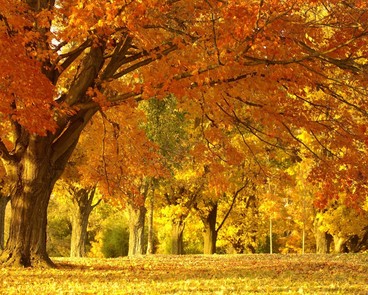 Rev 21:3-6 One of the first and greatest teachers we will ever have in our lives is the sacred creation around us. On the small farm where I grew up I learned about the cycles of seasons, life and death, growth and stagnation, giving and taking. In Indiana we pride ourselves on our four seasons, and the lessons we glean from each one of them can teach us most of what we need to know about life. We call autumn fall as leaves dazzle us in yellow, orange, red, brown and fall in a crunchy blanket over the cooling earth. While each leaf dies and falls, the trees don’t die. In fact, the leaves die so the tree can live, so the tree can conserve precious energy through the winter and be alive come spring for new leaves, new buds, new fruits, new life, to resurrect. Fall teaches us that no single death will ever end life. Christians often understand Jesus’ death to end death for all of us: we will still experience a physical death on earth, but will experience an everlasting life thanks to Jesus’ death and resurrection. We read in Revelation today "death will be no more." Some people believe that Jesus will physically return and all the dead will rise again. Some people believe Jesus' return will bring a final reckoning. However you understand the book of Revelation, we worship a creating and recreating God. Even while we wait for the fullness of Christ to be revealed among us, God is making all things new, again and again, and Jesus shows us a way to escape death. Let me be more specific. Zechariah foretold the power of Jesus, saying, “By the tender mercy of our God, the dawn from on high will break upon us, to give light to those who sit in darkness and in the shadow of death, to guide our feet into the way of peace” (Luke 1:78-79). Jesus' life and death did not end death itself, rather Jesus invites us out from under the shadow of death. The fear of death undergirds a staggering array of human suffering – fear of flying, fear of heights, fear of illness, fear of aging, but our fear of death also shows up as greed, insecurity, jealousy, and shame. Jesus tells us, “I came that they may have life, and have it abundantly” (John 10:10b). Jesus offers us an abundant life free of the fear of death. Jesus tells his disciples, “Are there not twelve hours of daylight? Those who walk during the day do not stumble, because they see the light of this world. But those who walk at night stumble, because the light is not in them” (John 11:9-10). Walking at night, living in the shadow of death, is the “death” that Jesus invites us to avoid. Walking in the light of this world, in the abundant life Jesus us calls us to live, means living with less fear, especially of death...." 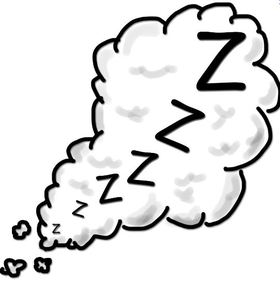 Psalms 16 & 23 The Centers for Disease Control know that insufficient sleep is a public health epidemic in the United States, contributing to car crashes, industrial disasters, medical and occupational errors, as well as chronic diseases such as high blood pressure, diabetes, depression, obesity, cancer, general increased mortality and reduced quality of life and productivity. Yikes. How many of you got enough sleep last night? ... We’re born good at sleeping, many of us lose the skill as we age. Usually we get better at things the more we practice, but sleep is different. ... Theologian Fredrick Buechner writes “Sleep is a surrender, a laying down of arms. Whatever plans you're making, whatever work you're up to your ears in, whatever pleasures you're enjoying, whatever sorrows or anxieties or problems you're in the midst of, you set them aside, find a place to stretch out somewhere, close your eyes, and wait for sleep.” But surrender is the struggle. The older we get the more we unlearn surrender. Especially in a culture like US America, in which individualism, accomplishment, long to-do lists and ruthless striving are the keys to the kingdom, surrender and rest are demeaned as weak, needful, even lazy. Our faith heritage gives us the gift of Sabbath. From the very beginning, according to the first origin story in Genesis. “God blessed the seventh day and hallowed it, resting from all the work God had done in creation.” Ever since we’ve been trying to cultivate Sabbath in our own week, from the strict clarity of no work, no cooking, no driving, no writing in Orthodox Jewish Sabbaths to the slower pace of life with a focus on prayer and socializing on Muslim Fridays, and our own ways of spending Sunday afternoons – spending no money, taking a nap, or dwelling at a leisurely meal with people we love. Though not anchored in the Genesis story, Buddhists, too, observe uposatha about once a week, to cleanse the mind and find inner rest and joy. Sabbath’s first gift is rest – most of us are sleep deprived, emotionally drained, overstimulated and overstressed, so taking a day – or even part of a day – for rest is a relief. Underneath the rest we find spiritual wisdom. By abstaining from work on a Sabbath, we are forced to relinquish control. Any of us who have achieved some measure of success by our culture’s standards have projects and plans and programs that we’re busy juggling. If we step away for a moment, the balls would crash down on and all around us, right? But if we step back and disentangle from the daily grind, and I know some of you do this as a spiritual discipline already, if we choose to take a day of total Sabbath we have to step away from the juggling. Perhaps someone else gets a chance to spin the balls back toward the sky. Perhaps we find that some of these balls – the projects and plans and programs – can hover on their own for awhile. Amidst the discomfort of changing our style, it’s a gift to release control. The next layer of alienating blessing is what the heck we do with all that Sabbath free time. Maybe you already dwell in Sabbath space once a week. Maybe your Sabbath is spent sleeping, vegging out, reading books, planting trees. What do you do when you choose not to do anything? Psychologists at the University of Virginia found in a recent study that most of their participants preferred receiving a painful electric shock to being alone with their thoughts for 15 minutes. Seriously – faced with the choice, most participants chose a painful electric shock to avoid waiting in a room of their own for 15 minutes. Who are you in the midst of Sabbath? Who are you without tasks of daily life, without emails to read and respond to, without chores? That sounds like sleep – when else do we close all browser windows but when we close our eyes? When else do we turn off our plans but when we turn off the lights? When else can we tune in to the dreams in our minds but when we tune out of the worries in our heads? Buechner writes that in your sleep, “All the things that make you the particular person you are stop working — your thoughts and feelings, the changing expressions of your face, the constant moving around, the yammering will, the relentless or not so relentless purpose. But all the other things keep on working with a will and purpose of their own. You go on breathing in and out. Your heart goes on beating. If some faint thought stirs somewhere in the depths of you, it's converted into a dream so you can go on sleeping and not have to wake up to think it through before it's time.” ... Our sleep each night can be practice for our death, rather than something to avoid or fear because it is so unknowable, we can practice our death each night when we sleep, and each morning when we wake, we can awake to the mystery of what lies beyond the night of death, the sleep of death, that morning that we couldn’t quite predict before we closed our eyes – what time would the clock read when we first glance its way, what will the sky look like out the window – will it still be dark? Will it be raining? Will the sun shine bright? Will children be playing outside? Will the dog whine for a walk? Will someone have the radio turned up loud? We’ll find out. We’re lucky to have four seasons in Indiana because each one teaches us so much about life and death and new life. As winter looms around the corner, we’re practicing our death. God has worked into this world a nightly practice for death, and an annual long stretch of death practice in winter. Winter is Sabbath for Indiana farmers who come up with beautiful new quilt designs and write stunning poetry to pass the cold, idle days of winter. It’s tempting to make Sabbath lofty and fancy. Who wouldn’t be able to enjoy Sabbath on a Carribean vacation? But what about simple Sabbath, in our homes, in our daily lives, even in the cold of winter. Can we find ourselves in the moment in the midst of the day-to-day? ... |
Archives
January 2022
|

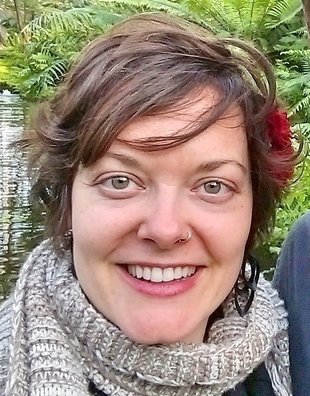
 RSS Feed
RSS Feed